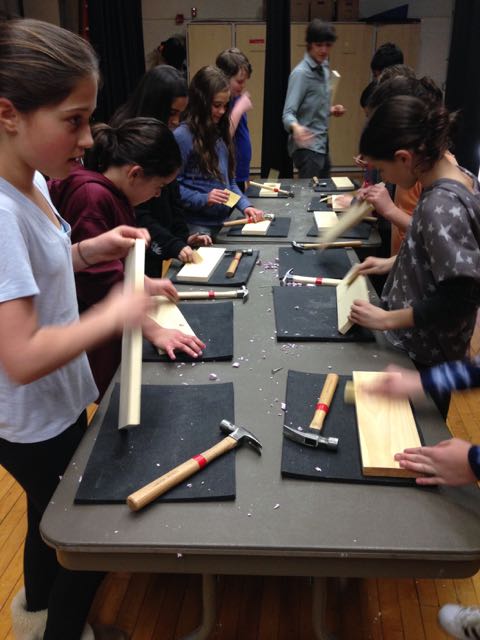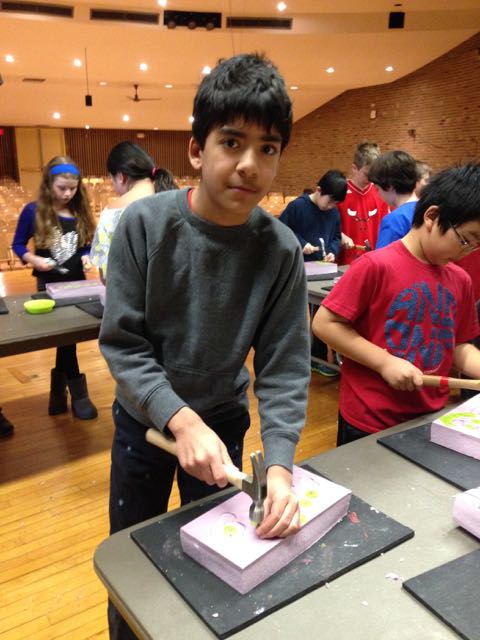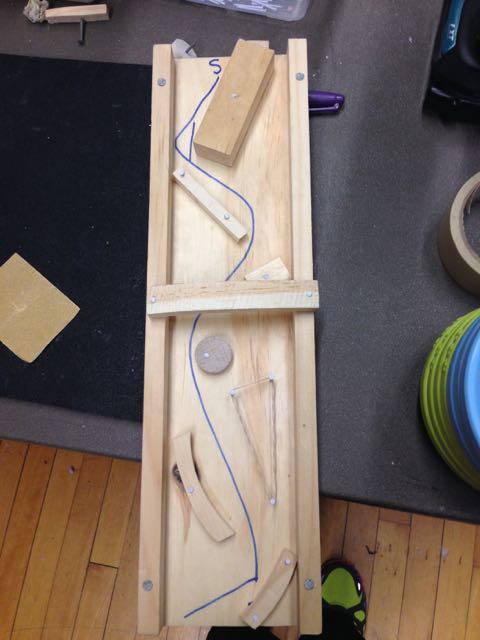Construction Kids Comes to Heathcote
- Details
- Written by Joanne Wallenstein
- Hits: 4553
 Whether you call it design thinking or woodshop, fifth graders at Heathcote learned to use tools, design and build at special workshops led by Construction Kids on Tuesday February 24. The school held three 90-minute sessions – one for each fifth grade class – where the kids learned how to use a hammer and nails and construction materials to design a project.
Whether you call it design thinking or woodshop, fifth graders at Heathcote learned to use tools, design and build at special workshops led by Construction Kids on Tuesday February 24. The school held three 90-minute sessions – one for each fifth grade class – where the kids learned how to use a hammer and nails and construction materials to design a project.
 The workshops were led by Construction Kids, design thinkers from Brooklyn, who conduct sessions in schools, host parties and lead activities at their own facilities in the Brooklyn Navy Yard. Kids experiment with materials and learn to safely use tools to plan, design, build and repair.
The workshops were led by Construction Kids, design thinkers from Brooklyn, who conduct sessions in schools, host parties and lead activities at their own facilities in the Brooklyn Navy Yard. Kids experiment with materials and learn to safely use tools to plan, design, build and repair.
The workshops at Heathcote first focused on using hammers and nails and then moved onto the creation of marble runs.
Both boys and girls were banging away with the hammers and happy as could be. I heard one enthusiastic young lady say, "This is so fun!". Another thought she might be able to help out at home with a flood caused by frozen pipes and a table of girls agreed that girls are "strong and brave" and just as good with a hammer as the boys.
 The activity was arranged by fifth grade teacher Christine Boyer who said that her class followed up the Construction Kids session by blogging about it online and including links to another design-thinking project they recently completed where they built Rube Goldberg projects.
The activity was arranged by fifth grade teacher Christine Boyer who said that her class followed up the Construction Kids session by blogging about it online and including links to another design-thinking project they recently completed where they built Rube Goldberg projects.
Parents Outraged Over Handling of Sexting Incident at SHS
- Details
- Written by Joanne Wallenstein
- Hits: 12344
 A representative of a parenting group of high schoolers called Scarsdale10583 to express outrage that Scarsdale High School had not taken action in a case involving "sexting." According to parents, a few weeks ago a tenth grade boy at SHS took a video of a sexual act involving himself and a ninth grade girl. Afterwards, he circulated the video – but it was not clear how widely it was disseminated.
A representative of a parenting group of high schoolers called Scarsdale10583 to express outrage that Scarsdale High School had not taken action in a case involving "sexting." According to parents, a few weeks ago a tenth grade boy at SHS took a video of a sexual act involving himself and a ninth grade girl. Afterwards, he circulated the video – but it was not clear how widely it was disseminated.
When the parents of the girl learned what had happened they were advised to go to the police --which they did. They were given the option of pressing charges against the boy but opted not to do so. Police were told that only a few others had seen the video and they called the recipients and asked them to delete it after they confirmed that it had not been shared further.
According to the ACLU, sexting is a felony, so there could have been major legal consequences if charges were pressed. Here's what they explain.
"Child pornography laws, originally designed to protect children against adult predators, inadvertently criminalize both consensual and non-consensual sexting where the person in the photo is under 18. The penalties are draconian. Under current Washington law, even any minor involved simply in consensual sexting with a person his or her own age faces felony charges, up to five years in prison, and mandatory sex offender registration."
The parents at the parenting group were angry that the boy suffered no consequences. Where is the school's Code of Conduct, they asked? According to a member of the group, the student plays on a sports team and was not suspended from playing, though other athletes have been suspended from teams for far more trivial offenses.
Why, they wondered, would there be stiffer penalties for missing practice than for circulating a pornographic video of a schoolmate? And what message was the lack of punishment sending to students about how to treat girls?
We called Scarsdale Schools Superintendent Thomas Hagerman for an explanation and here is what he shared:
Yes there is a Code of Conduct, but it only governs what happens on the school campus or at school sanctioned events. For incidents that occur off campus, parents are in charge and should turn to the police if laws have been broken. Though the school will cooperate with the police, they can't enforce behavior or punish students for actions that occur beyond the school's jurisdiction unless it involves a sanctioned team or club activity.
Hagerman did speak to Principal Kenneth Bonamo who confirmed that the incident occurred and said that from what he knew the video had not been widely distributed and that the two people who had seen it had not distributed it. However parents say that many students in the school are aware of the identities of those who were involved, damaging their reputations.
Hagerman said that youth outreach workers from Scarsdale & Edgemont Family Counseling are on site at the school and are trained to discuss these types of issues with students. They will do so when appropriate.
Snowman Contest!
- Details
- Written by Joanne Wallenstein
- Hits: 4507
 Just in time: The Scarsdale Recreation Department has announced their annual snowman contest! You can use the record snowfall from Winter Storm Juno to get out of the house and be creative.
Just in time: The Scarsdale Recreation Department has announced their annual snowman contest! You can use the record snowfall from Winter Storm Juno to get out of the house and be creative.
Here's how it works:
- Build a snowman, snow-woman or snow animal on your own property. Use props, costumes and accessories to dress up your guy.
- Your creation must be freestanding.
- When you complete it, take a photo of it – family members can be included.
- Send the photo with your family name and address to the recreation department at [email protected].
- Judging will take place on Friday January 30. A judge may even visit your home to get a closer look.
- Winners will be posted on the Village website and notified via email by Monday Febraury 2.
So don't just look out the window – go out and make a snowman.
Raising Self-Directed Teens
- Details
- Written by Rand J. Gruen
- Hits: 12487
 Adolescence is a complicated, rewarding, and challenging time for both parents and teens. As a parent, you go about your day-to-day, and at some point, suddenly recognize that your child is different – they are growing up physically, they take on distinctive mannerisms, and they talk about the world and their friends in a different, more adult-like way... and hopefully, we begin to see some of the traits that we value and have tried to instill in them as people.
Adolescence is a complicated, rewarding, and challenging time for both parents and teens. As a parent, you go about your day-to-day, and at some point, suddenly recognize that your child is different – they are growing up physically, they take on distinctive mannerisms, and they talk about the world and their friends in a different, more adult-like way... and hopefully, we begin to see some of the traits that we value and have tried to instill in them as people.
As Director of Westchester CAPS (Westchester Child and Adolescent Psychological Services, PLLC), I see lots of teenagers and families. If I step back and ask myself 'what are the most important traits parents want to see develop in their children?' I would say that the ability to be 'self-directed' and 'accountable' – i.e. the ability to set goals, create a plan to achieve those goals, take ownership of the process, and follow through – are at the top of the list.
Why is this important?
Initiative, the ability to define a direction consistent with one's goals, and the capacity to organize oneself breeds success. Once our children leave home and/or enter college, we are no longer there to provide them with ongoing direction and immediate feedback. Unless they have internalized these skills and abilities, there is a risk they will flounder, get lost, or make the wrong decisions.
The challenge.
Some kids are self-directed from an early age. But many are not. If they are not, we need to teach them these qualities. Teens often have difficulty doing their homework, studying for tests ahead of time, taking the initiative to get summer jobs, etc. The college application process presents a series of hurdles. Our kids have to identify what college they want to go to, study for entrance exams (the SAT or ACT), request application materials, complete essays, file applications on time, set up interviews...the list goes on an on. Once our kids are in college, they have to decide on a major, keep up with assignments, do well in their classes, meet the right people, identify job opportunities, apply to jobs or graduate school, etc. This is a long list and a tall order.
Where do we get stuck: A case in point.
The day before I sat down to write this article, I was talking with a mom in our practice who has a 14-year old son. She relayed the following: "I don't know what to do with my son anymore. I would like him to do his homework when he comes home (from school), but he has never been disciplined in that way. At some point after dinner, I go upstairs and ask him how he is doing with his homework. His response is "I'm going to start it in a minute". Over time, I have learned that a minute could mean anywhere from 10 minutes to 2 hours. I return in 30 minutes to ask him how he is doing. His response is 'Mom, stop nagging me, I'll get it done'. I know that if I go in again we're going to get into an argument, but if I don't, he won't start his homework until later when he is too tired to learn anything. He gets decent grades, but I know he is capable of more. So I'm stuck."
In this family, mom and teen are indeed stuck. Mom has taken on the role of the enforcer - the policewomen. The minute you get yourself into this role, it's game over. Because children see you as the enforcer and the driver of responsible behavior they abdicate responsibility for things they should do and get angry at you for trying to make them do what they should be doing. In this type of situation, the very things parents are doing to fix the problem make the problem worse.
The trick in parenting teens.
The trick in parenting teens is that when children enter adolescence, you have to shift your mindset about what your child needs from you. Simply put: young children want to be told what to do. They ask questions like "when should I do my homework"; "how do I do this [math] problem"; can you help me write my essay; I don't know how to do it".
Teens want to figure out what to do on their own without being told what to do. They want to decide on their own when to do their homework, they want to pick their own friends, and they want to decide how to spend their time on the weekend.
When a child enters adolescence, a child's needs change, and we, as parents, need to change along with them. If we don't, we get stuck.
What causes this shift?
The primary developmental tasks for younger children and teenagers are very different. Younger children need to learn rules and facts. The simplest way for them to learn this is to ask someone who knows the answers. Typically, that's us. The focus in the teenage years shifts from learning rules and facts about the external world to learning about oneself - how we fit into groups, what we aspire to, what we want to do with our lives. This can't be taught by parents - we can advise, but we can't tell our child who they are as people. They need to figure out the answers to this on their own.
Another developmental task for teens is to become more independent in preparation for moving out of the house and living on their own. This requires that we allow our teenage children to make more and more decisions on their own. If we don't allow them make their own decisions (when appropriate), power struggles develop.
What do we need to do differently?
The developmental shifts that occur in our children necessitate a fundamental shift in how we operate as parents. We need to shift from telling our children what to do, to asking them what they think they should do. (Obviously there are times when we need to tell our children what to do and say "no", but the frequency with which this occurs should decrease as they get older.)
As parents of teens, one of our primary goals is to enable our children to make the right decisions on their own. The best way to do this is to learn to ask the right questions rather than to tell children what to do. For example, our teen may ask if he can go out to the movies on a school night. Option A is to say "no, that's ridiculous. How are you ever going to get up tomorrow?" This makes the child feel stupid and embarrassed for asking, and angry at the parent who said 'NO'. Option B would be to say: "What do you think? You have a test tomorrow and need to get up early. Do you think it's a good idea to go to the movies? What about going on the weekend instead?" If the child continues to insist they should be allowed to go, we can then use our parental authority and say no, but we want them to begin to use their own logic to sift through problems.
By asking the right questions we force our children to think for themselves. We force them to think about the pros and cons of a situation and what the consequences will be if they make one decision versus another. And this is exactly what we want them to do on their own when they move out into the world.
Parents mistakenly think that if they tell their kids what to do, their kids will adopt these positions and use them when they're out in the world – i.e. in college. This is often not the case. At the most fundamental level, teens often do not need answers to questions; they need to ask themselves what they think they should do. They need to have a mental process in place to sift through options and come up with the right solutions. This takes practice. If we enable this, they can utilize this skill for the rest of their lives.
What are we shooting for in our relationship with our teenage kids?
Ideally, we want to be seen as trusted advisers to our children. We have more experience than they do and we can impart some of this to them. We want them to learn to think through problems on their own, but we also want them to come to us when they don't know the answers and ask for our help. And more importantly, when we give them advice, we want them to listen.
If we are locked in a power struggle with our kids, if they feel like we are trying to control them and make decisions for them, this won't happen. At the end of the day, we become disabled in terms of our ability to foster a sense of self-direction and accountability in our children. They will not come to us for advice and we will not be able to help them course correct when they are headed down the wrong road. This is an enormous loss for a child and it can be avoided.
 Rand J. Gruen Ph.D. is the Executive Director of Westchester CAPS, an interdisciplinary, outpatient mental health center providing individual therapy to children, adolescents, and adults; couple and family therapy; neuropsychological assessment; medication management, and tutoring. Dr. Gruen received his B.A., M.A. and Ph.D. in Psychology from the University of California, Berkeley. He was formerly a fellow at Yale University School of Medicine and an Assistant Professor in Psychiatry at New York University Medical Center.
Rand J. Gruen Ph.D. is the Executive Director of Westchester CAPS, an interdisciplinary, outpatient mental health center providing individual therapy to children, adolescents, and adults; couple and family therapy; neuropsychological assessment; medication management, and tutoring. Dr. Gruen received his B.A., M.A. and Ph.D. in Psychology from the University of California, Berkeley. He was formerly a fellow at Yale University School of Medicine and an Assistant Professor in Psychiatry at New York University Medical Center.
How To Find a Babysitter Who's Right For Your Family (from a teen sitter's perspective)
- Details
- Written by Lena Proctor
- Hits: 6010
 I can't count how many times local moms have asked me to babysit or sought help to find a babysitter. They want to know where they can find one, who they can call and what they will have to pay.
I can't count how many times local moms have asked me to babysit or sought help to find a babysitter. They want to know where they can find one, who they can call and what they will have to pay.
Though I do babysit and have friends who do as well, it's not always easy for either my friends to find a job that works for them or for parents to find a babysitter who is available when they need one. Here are some tips for parents to find a babysitter that will meet their expectations:
1) Where to look for names? Here are a few ideas. Ask neighbors with teens to can give you ideas and options. Also, the Scarsdale High School youth employment service called the Y.E.S office keeps lists of students who wish to babysit and you can post a job listing with them. You can find them here: If your kids go to summer camp, another easy way to find a babysitter is by asking one of your kids' favorite counselors to sit. You will have a head start because you already know the sitter is responsible and that your child likes the counselor.
2) Timing is everything: One of the first questions to ask a prospective sitter is their availability. If you need someone for Saturday nights and they are already booked at that time, go no further and call the next number. Keep in mind that many of the babysitters are quite busy with school, "There have been times when it is neurotic how much I am relied upon," says a Scarsdale High School student. If you really like your babysitter, communicating with them and scheduling a day that works both of you is important. Sophomore Aggie Chamlin says, "I try my best to accommodate the families but it doesn't always work out. This sometimes results in them changing the date or time so that they can go out and know that their kids are happy and safe."
3) The interview: Here are some good questions to ask a potential sitter:
• Why/when did you start babysitting?
• What experience do you have?
• When are you available? Friday/Saturday nights?
• If you have younger children: what is your experience with infants?
• What training do you have in first aid or babysitting?
In terms of a teen's work experience with children, you can consider not only babysitting jobs, but work as a summer counselor too.
4) Set clear expectations ahead of time: One student who babysits said, "The bad experiences I had were mostly when one of the children were in a cranky mood and I didn't know how to deal with them, like if they had a favorite book or food..." Communicate your daily routines to your sitter and let them know the "house rules." For instance: are electronics allowed? Dessert? Is the oven allowed to be turned on for baking? Both you and the babysitter will be much more comfortable if they know what's allowed and what's not.
Also let the sitter know how much you expect them to do in addition to watching the kids. While some families ask the sitter to help bathe the children, cook dinner, dress them or clean up, others just want the sitter to keep the kids happy while the parents are out. If your babysitter is worried about making dinner while taking care of the kids, don't ask him/her to do too much more.
5) Talk to your kids about how it went after the sitter leaves: Their feedback is probably the best way to know if you should hire the sitter again. Chamlin says, "in order to guarantee that your kids have a positive and fun experience while you are out, make sure that your children like the babysitter you pick." Another Scarsdale High School student Eliza Auchincloss says, "It's a lot nicer when the kids can communicate and are able to open up to me because it makes the job way more enjoyable." When the kids feel comfortable around your babysitter, the experience is positive for everyone; you, your kids, and the babysitter.
5. Some other tips:
• Don't forget to prepare food beforehand: not only for your children but also your babysitter.
• If your potential babysitter is too young for your comfort level, ask them to bring a friend along.
• Staying out late? Give the sitter a time later than you think you'll be out; it's always better for you to come home early than late. If you are out and figure out that you will be coming home later than you told your babysitter, call and let them know.
• Even if your babysitter lives close: offer to drive home if they don't have a car. Remember that your babysitter is also someone's child!
• How much should you pay? The going rate is anywhere from $12-$15
Are you available to babysit or looking for a sitter? Post your name/number in the comments section below!













